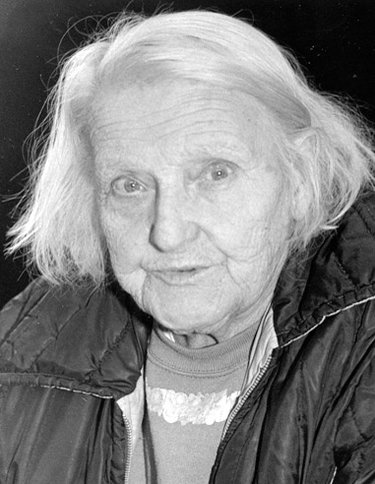Irma Margarita Fox Garlock
KNOX — Irma Margarita Fox Garlock carved a life of self-reliance.
An independent woman who valued honesty, she didn’t let hardship mar her good humor and she was able to find and create beauty from everyday objects.
Mrs. Garlock died peacefully on Tuesday, Feb. 24, 2015. She was 98.
“She was a giver, not a taker,” said her niece Alice Jones. “She could fix anything.”
A self-taught carver, Mrs. Garlock showed off one of her works during a visit from The Enterprise in 2010. At the age of 93, she was able to joke about death. She held up an expertly whittled cow, painted in black and white, giving a farmer a hard time with milking; the farmer was falling backwards. “I call this ‘Kicking the Bucket,’” said Mrs. Garlock with a laugh.
She knew about farming. She and her husband, Frank Lawyer Garlock, whom she said she had known since she “was a tadpole,” farmed 100 acres in Knox. He had been in the Navy on a minesweeper before he took up farming.
“They had a wonderful marriage,” said Mrs. Jones. “He was a very good uncle, and she was a very, very good aunt.” The Garlocks moved to Knox in 1955, living at first in a trailer and later in an apartment that was part of the barn. The couple had a daughter, Della, who died before her.
After her husband died, Mrs. Garlock carried on their work. “She was a farmer until she couldn’t do it any more,” said her niece. “She milked the cows; she did everything. She kept it up until she got behind in bills, then she had to sell the land. She built a little house there herself; she was so handy.”
Mrs. Garlock continued to garden and loved fishing, her niece said. “She’d fish in any crick,” said Mrs. Jones. “She didn’t want nobody living with her after my uncle died.” Life wasn’t easy in the home she’d built herself, but she did not complain. “She had a well; she’d bring in her own water,” said her niece. “She’d go in the woods and gather her own wood to heat with...She didn’t want to give up the land. She had a lot of good memories there with my uncle.”
Mrs. Jones went on, “I learned a lot from her. She was into rocks and knew all about them.” Mrs. Garlock carved rocks and wood into all sorts of figures. She often carved likenesses of the animals she raised — collies and rabbits and goats. “She showed them at the fair and won many blue ribbons,” said her niece of the prizes awarded for the animals she bred.
“She could tell you about all the different breeds,” said Mrs. Jones. “She was very, very smart.”
Mrs. Garlock also worked on historic displays at the Altamont Fair. She was friends with the late Roger Keenholts, Altamont’s longtime historian; the two of them worked together to reupholster an antique couch for the fair’s farm museum. “We had a ball,” Mrs. Garlock said.
Mrs. Garlock found pleasure in her work and beauty in everyday objects, creating jewelry out of local stones as well as carving pieces of wood she found.
“She could pick up a piece of wood and make anything out of it,” said Mrs. Jones.
Mrs. Garlock said she carved what she saw in a piece of wood. One day, as her neighbor was chopping wood, a chip flew off and Mrs. Garlock asked if she could have it. She made the stray piece of wood a pheasant’s tail, carving a magnificent pheasant, looking into its nest.
She was modest about her work. “I dabble in it,” Mrs. Garlock said. “I go outside and look all around and see all the beauty there is. Nobody can really copy that.”
Mrs. Jones recalled how, as a Catholic schoolgirl, “I had to bring in the Nina, the Pinta, and the Santa Maria,” the ships used by Christopher Columbus in his 1492 voyage to America. “My aunt got three big bars of Ivory soap and she carved the three ships,” said Mrs. Jones. “They were beautiful...The nuns kept them.”
When her hands became too arthritic to work with a knife, Mrs. Garlock began painstakingly piecing together matches to create a village of thatched-roof buildings.
They reflected her local heritage. Her Palatine ancestor, William Fox, came to America in 1710, settling where the lower fort is now preserved just outside the village of Schoharie. William Fox gave his name to the Foxenkill, which flows through Berne and Gallupville into the Schoharie Creek.
Mrs. Garlock also turned everyday household objects into art rather than discarding them. She painted two wine bottles for her niece with winter scenes. “One had a house in the woods and the other was all snow and trees,” said her niece. “She’d give away the things she made; she never sold them. If you admired something, she’d want to give it to you.”
Mrs. Garlock developed this generous and optimistic nature despite a difficult childhood.
She was born in Rensselaer on Oct. 31, 1916, the daughter of the late Daniel Ezra and Roslin (née Squire) Fox. Her father was a welder, she said. Her mother died when she was young. She and her sisters were placed in St. John’s boarding school in Rensselaer when she was about 10, she said; she lived there until she turned 18.
Mrs. Garlock pulled up the legs of her slacks to show her swollen knees, and said they got that way from hours of prayer and scrubbing the floor at St. John’s. “For punishment, they made us kneel for a day in the chapel,” she said.
Mrs. Garlock went to the nursing home in Guilderland Center three years ago, said her niece, because she couldn’t manage anymore on her own. “Her legs went,” she said. “It came from being forced to scrub the slate floors in the orphanage on her hands and knees. Her legs just gave out.”
“I never had a mother,” Mrs. Garlock said. “She died when I was not quite three.” But all her life she held on to some advice she had gotten from her grandmother, spoken as her daughter put on rouge: “If you is what you ain’t and ain’t what you is, then you ain’t much of anything at all.”
“She was a very good woman,” Mrs. Jones said of her aunt. “She wouldn’t hurt a flea. She never had an angry word in her. If she was angry, you’d never know it. She never had a bad word for anyone.”
****
Irma Margarita Fox Garlock is survived by six grandchildren, numerous great-grandchildren, and many nieces and nephews.
Her beloved husband, Frank L. Garlock, died before her as did her daughter, Della Hoffman.
A funeral was held on Monday, March 2, at Fredendall Funeral Home in Altamont. Interment will be at Albany Rural Cemetery in Menands. Mourners may leave condolences at www.fredendallfuneralhome.com.
— Melissa Hale-Spencer



